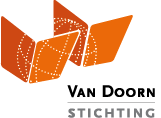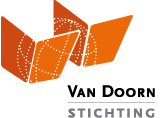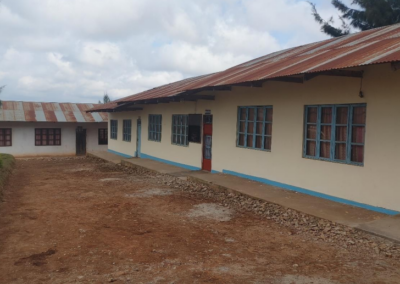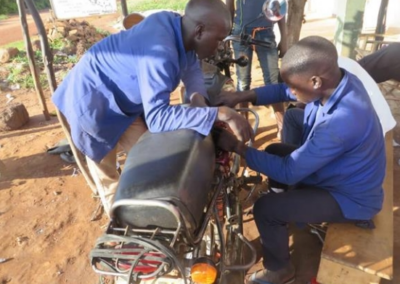The Hope for the Community Foundation (HCF) has set up a tailoring training center with the support of the Van Doorn Foundation. After training these girls and young women are assisted in setting up their own sewing workshops.
Garments made by students are sold through a specially established shop. The training center receives orders from schools to make school uniforms and from private individuals to make garments.
Project has been executed successfully!
Amount donated: € 5,000.-
Sponsor: Rabobank Share4More
Project information
The situation
Kigoma used to be an important port on lake Tanganyika, but now the city is abandoned and forgotten. Kigoma has a population of 140.000 and a high unemployment rate amongst young people. The local government gives high priority to providing vocational training which can lead to small and medium size self-entrepreneurship.
The implementing organisation
The Hope of the Community Foundation (HCF), a local non-profit organization, was created to support girls of which one or both parents deceased from AIDS. HCF supports the Mwocachi orphanage but also street girls in some districts of Kigoma City where these girls often live on the streets, are abused, end up in prostitution, and / or experience other problems.
The envisaged project results
In 2012, HCF conceived the idea of establishing a sewing training center for these girls and young women and to guide them in establishing small home-industries. For this, HCF contacted the Van Doorn Foundation. During a visit in March 2013, Paul met the management and staff of HCF as well as future students. Through a workshop he taught the participants how to establish a business plan to start a vocational training centre. After this workshop and having obtained a commitment from the local government to support it, HCF was ready for the start of the project.
Meanwhile the Van Doorn Foundation started searching for sponsors for this promising project, and to our delight Rabobank’s staff participation fund Share4More was willing to contribute € 5000, – for the establishment of this training centre. With this amount, sewing machines, equipment and tools have been purchased and the teachers paid for the first year.
The chance of sustainability
The local population is through neighborhood committees actively involved in the project; as they are responsible for the selection of young people from their neighborhood, which they think should be given a chance to follow the training. The neighborhood committees are also actively involved in the search for sites where those who have completed their training can set up their own businesses.
The garments made by the students are sold through a specially established shop, and the training centre receives orders from individuals to make clothes. The material is made available by the individuals, and the money to make the clothes can be used to pay teachers. By generating, in this way, income itself makes the vocational training centre eventually financially independent from donations.
In addition for the recently established tailor workshops (home industries); orders have been received from schools to make school uniforms.
The progress of the project
The project started early May 2013. By the end of October 2013 the first group of 10 young women (single mothers and former prostitutes) finished their courses at the HCF vocational training centre! Within six months they have been able to gain basic knowledge of designing clothing and sewing skills and able to make garments. Following the training, they have been assisted) in establishing their home industries (by making sewing machines available and by coaching from HCF) which makes them not only independent but also respected members of the local community.
In December 2013 the training of a second group of students started.
The result
The vocational training center has been established, using Share4More funds and a yearlong coached by Van Doorn Foundation to ensure that the organization can continue managing the center itself thereafter.
The training center has been registered with the government, i.e. the Tanzania Vocational Education and Training Authority (VETA) in Kigoma and was certified as an approved training center. With this certification diplomas issued by HCF to students will also be recognized by the government.
Important has been the local government initial project approval and their enormous excitement about the results. It considers the project as a model for similar projects in other cities in the region. It directs therefore donors to the vocational training centre to motivate them to adapt this best practice in other cities.
For these projects your support is necessary!

Bedankt!
Bedankt dat je wilt bijdragen aan dit project! Vul hieronder het formulier in en je wordt naar een iDeal pagina gebracht om de betaling te kunnen doen.




